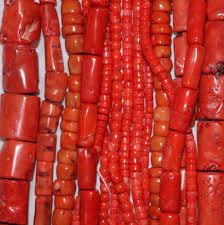
Jul 06 , 2024
Coral Beads: The Resplendent Adornments of African Heritage
Coral beads, known for their vibrant colours and intricate craftsmanship, hold a special place in various African cultures, particularly among Nigeria's Yoruba, Benin, and Igbo people. These beads are more than mere ornaments; they are symbols of wealth, power, and cultural identity. This blog explores coral beads' rich history, cultural significance, and timeless appeal in African societies.
The Origins of Coral Beads
Coral beads have a long and storied history in Africa, dating back centuries. These beads are crafted from coral found in the ocean, particularly in the Mediterranean and Red Seas. The trade of coral beads into Africa was facilitated by early Mediterranean and trans-Saharan trade routes, where corals were exchanged for gold, ivory, and other valuable commodities.
In Nigeria, the art of coral bead making and usage became prominent in the ancient Kingdom of Benin, where the Oba (king) and his court adorned themselves with these precious beads to signify their high status and divine authority. The Yoruba and Igbo people also adopted coral beads, incorporating them into their cultural and ceremonial practices.
Cultural Significance
Coral beads are deeply ingrained in many African communities' cultural and social fabric. They are not just decorative items but carry profound symbolic meanings and are used in various rites and ceremonies.
Royalty and Chieftaincy
In the Kingdom of Benin, coral beads are synonymous with royalty. The Oba of Benin is often depicted wearing elaborate coral bead regalia, including crowns, necklaces, bracelets, and anklets. These beads symbolise the Oba's divine right to rule and his connection to the gods. The coral beads' intricate designs and vibrant colours are a testament to the kingdom's wealth and artistic excellence.
Similarly, in Yoruba culture, chiefs and traditional rulers wear coral beads during significant ceremonies and festivals. These beads mark their status and authority, distinguishing them from the common populace.
Weddings and Ceremonial Attire
Coral beads play a crucial role in traditional African weddings. In Yoruba and Igbo weddings, the bride and groom often wear coral bead necklaces, bracelets, and earrings. These beads are beautiful and carry blessings of fertility, prosperity, and marital harmony. The vivid red and pink hues of the coral beads are believed to ward off evil spirits and bring good fortune to the newlyweds.
Ancestral Worship and Spiritual Significance
Coral beads are also used in various religious and spiritual practices. Among the Yoruba people, coral beads are often offered to deities and ancestors as a sign of respect and devotion. The beads are believed to possess protective and healing properties, making them an integral part of religious rituals and ceremonies.
The Craftsmanship of Coral Beads
The process of making coral beads is a meticulous and labor-intensive art. Skilled artisans carefully select and carve the corals into beads of various shapes and sizes. These beads are then polished to enhance their natural luster and vibrant colors. The craftsmanship involved in creating coral beads ensures that each piece is unique and holds its own distinct charm.
In modern times, coral beads are often combined with other materials such as gold, silver, and gemstones to create stunning jewelry pieces. This fusion of traditional and contemporary elements has helped coral beads remain relevant and sought-after in today's fashion world.
Modern Adaptations and Global Appeal
While coral beads are deeply rooted in African tradition, they have also found their way into global fashion. Designers and jewelers worldwide have embraced the beauty and versatility of coral beads, incorporating them into various modern designs. From statement necklaces to elegant earrings, coral beads add a touch of exotic elegance to any outfit.
Efforts to preserve and promote the art of coral bead making are being undertaken by cultural organizations and artisans. Workshops, exhibitions, and festivals are organized to educate people about the history and significance of coral beads, ensuring that this ancient craft continues to thrive.
Conclusion
Coral beads are more than just beautiful adornments; they are a symbol of cultural heritage, identity, and artistry. From the royal courts of Benin to contemporary fashion runways, coral beads have transcended time and geography, continuing to captivate and inspire.
By appreciating and preserving the tradition of coral bead making, we honor the rich history and cultural legacy of African societies. These resplendent beads, with their vibrant colors and intricate designs, will forever remain a testament to the artistic ingenuity and cultural richness of Africa.



